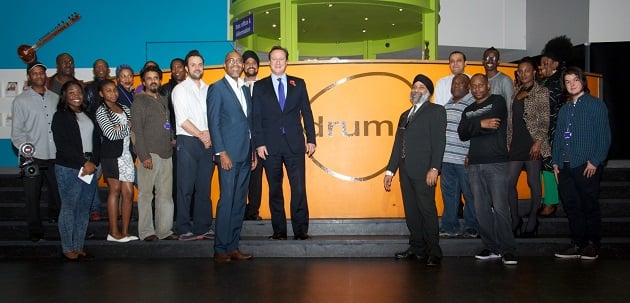Black arts matter: Saving The Drum
April 13, 2016

The Drum welcomes David Cameron to discuss Birmingham’s business future, 2013
The arts in Birmingham were dealt a severe blow earlier this month with the announcement that The Drum will be closing its doors in June after over twenty years of serving the local community. Situated in Newtown (part of wider Aston), one of Britain’s most deprived wards, The Drum has hosted performing arts events oriented toward the local BAME community. This year, following on from a failed application to extend the venue vertically to solve cooling and leakage issues, the plug has been pulled on this vital provision. Whilst the Arts Council “remain committed” to ensuring access to the arts in Aston, the precarious nature of these programmes in this post-recession climate is acutely obvious.
Opened in 1994, The Drum provided a true focal point for local culture. Through its Young Gifted Brum programme, young people were involved in music and media projects and appeared truly energised in promotional material that they created. Elsewhere the Andy Hamilton Studio and main auditorium hosted Laura Mvula, Bettie White and the recently opened New Centre for Contemporary Cultural Studies which sought to continue the legacy of the Stuart Hall’s Birmingham School of Cultural Studies.
It is hard to imagine an area where removal of a provision such as The Drum will be more keenly felt. According to City Council figures released in 2010, 40% of Birmingham’s population live in areas described as the most deprived 10% in England and 23% of the population live in areas in the most deprived 5%. When referring to the Index of Multiple Deprivation, time and time again Aston, Lozells and Handsworth top the bill on income, education and crime figures. Local schools such as Holte Visual and Performing Arts College grapple with integrating a regular influx of refugees and other non-English speakers and directly utilise the arts to motivate and galvanise students.
We can’t all rely on everything being in the city centre. Birmingham is a large place and we need cultural and arts facilities throughout the city, especially in areas of real need. Chief executive, Newtown Cultural Project Ltd Charles Small
Newtown Cultural Project Ltd. trustees are also involved in the Simmer Down Festival, the spiritual successor to the legendary Handsworth Carnival, which has welcomed reggae luminaries Steel Pulse and Apache Indian to the stage. This represents a coherent cultural thread and a vibrant legacy of arts, music and activism in Birmingham which forms the bedrock of local community and culture. As local councils slash spending to the arts, this regional foundation is jeopardised and young people lose the context and strengthening influence of their communal heritage.
the future of arts funding seems increasingly reliant on the spin of a national wheel of fortune. – Dr Dave O’Brien Senior Lecturer in Cultural Policy at Goldsmiths
Too often the vagaries of Arts Council funding create a confusing patchwork of success and failure, one equally worthy project succeeds in its dream bid, and meanwhile vital local schemes or venues are shuttered. The centralised, omnipotent committees of careerist arts barons now hold the purse strings as local councils are increasingly unable to support arts projects directly. The Arts Council may now represent an acceptable face of the confluence between commerce and culture and the inherent potential for profitability in the arts. Is this organisation functioning as a de facto arm of central government?
by focusing on marginalised communities, by putting the formerly invisible centre-stage, and by ensuring that more children and young people can enjoy the opportunities of cultural education, these are some of the ways we are building diversity into our thinking so that everybody will know that the arts are for them. – Peter Bazalgette, Chair Arts Council England Keynote Address at Diversity and the Creative Case December 2015.
Unaccountable and distant, any funding received from the Arts Council is subject to various politicised conditions and tertiary considerations of profile and return on investment (Bazalgette’s troubling referral to “income streams”). With so many regional projects competing for the same money pot, it is almost inevitable that the less glamorous will fall by the wayside. The Drum, with its limited capacity and aging facilities, was in dire need of a revamp which sadly now may never come.
Join the conversation with #BlackArtsMatter and sign the support petition here. For more on cuts in Birmingham, read Charles’ piece on Birmingham’s new library.

Comments